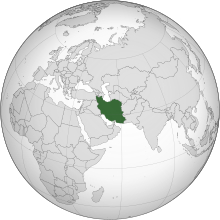Homosexuality in Iran
| LGBT rights in Iran | |
|---|---|

|
|
| Same-sex sexual activity legal? | Illegal: Islamic Sharia Law is applied |
|
Penalty:
|
Imprisonment, lashing, execution (see below) |
| Gender identity/expression | Sex reassignment surgery (male to female) partially paid for by the government |
| Discrimination protections | No |
Lesbian, gay, bisexual, and transgender (LGBT) persons in Iran face legal challenges not experienced by non-LGBT residents. Both male and female same-sex sexual activity is illegal.
LGBT rights in Iran have come in conflict with the penal code since the 1930s.Homosexuality is a crime punishable by imprisonment,corporal punishment, or by execution. Gay men have faced stricter enforcement actions under the law than lesbians. However, it is disputed as to whether the executions of Mahmoud Asgari and Ayaz Marhoni, or three other men executed in 2011 in Khuzestan province were punishment for other crimes or carried out specifically because of their homosexuality.
Any type of sexual activity outside a heterosexual marriage is forbidden. Transsexuality in Iran is legal if accompanied by a sex change operation, with Iran carrying out more sex-change operations than any other country in the world after Thailand. These surgeries are typically partially funded by the state – there have been claims that some homosexual men may have been pressured to undergo them both by government and society. Transsexuals still report societal intolerance as in other societies around the world.
Ancient Iranian society had a tradition of polytheism and initiatory pederasty, which came into sharp conflict during the Achaemenid period. Iranian pederasty and its origins was debated even in ancient times. Herodotus claimed they had learned it from the Greeks: "From the Greeks they have learned to lie with boys." However, Plutarch asserts that the Iranians used eunuch boys to that end long before contact between the cultures. In either case, Plato claimed they saw fit to forbid it to the inhabitants of the lands they occupied, since "It does not suit the rulers that their subjects should think noble thoughts, nor that they should form the strong friendships and attachments which these activities, and in particular love, tend to produce."
...
Wikipedia
